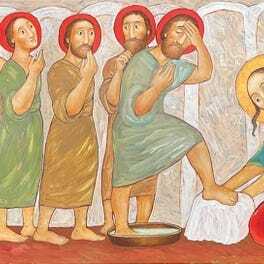The Parable of the Ridiculously Persistent Owner

Tamed Cynic is a reader-supported publication. If you appreciate what we do, consider becoming a paid subscriber.
This coming Sunday’s lectionary Gospel is Matthew 21.33-46, a passage frequently titled “The Parable of the Wicked Tenants.”
It’s an astonishingly stupid name for the story Jesus spins.Jesus, without the benefit of a seminary education, is in the Temple preaching:
“This place is supposed to be a house of prayer, but you’ve turned it into a den of robbers. And look, with all your tight-sphinctered, keeping-up-appearances piety, you’ve pushed all the people with actual biblical problems— the poor, the blind, and the lame— to the margins. And you money-changers, you call that a fair price for a goat? Exactly what part of the commandment (If you lend money to any of my people with you who is poor, you shall not exact interest from him) is unclear to you? I’ve seen fairer prices in airport food courts.”
Just to drive the point home, Jesus offers his listeners a sermon illustration. Jesus takes an ordinary innocent fig tree that, so far as we know, never did anything wrong to Jesus, and Jesus gives it the stink eye and hollers with his outside voice, “May no fruit ever come from you again!” And the fig tree, the Gospels report, withered at once.
In response to his arboreal assault-and-battery, Jesus’s listeners start in on his bona fides.
“Just where in the @#$% does he get off, preaching like that?! What divinity school did you say you attended? We liked the last preacher we had a lot better than you?” “No, you didn’t either,” Jesus replies, “Your last preacher was John the Baptist, and you all killed him and served him for dinner. It’s not the messenger that’s your problem. It’s the message.”
And while they chew on that truth bomb, Jesus, proving he’d never pass the United Methodist Board of Ordained Ministry, doubles down on their offense and spins the rudest of all his parables:
“Once upon a time, before he bought Twitter to save democracy Elon Musk bought some land up in Napa because he fancied the notion of playing the vintner one day after he’d cashed out his stock options and retired early. When it came time for harvesting the grapes, the vineyard owner sent some of his interns up north with a message, and dammit if the fruit pickers didn’t beat one, kill another, and stone still another. The rich guy, though, he’s an odd one. The owner of the vineyard doesn’t react the way you might expect. He doesn’t call the police, cancel them on Twitter, or take his helicopter up to Napa to take matters into his own hands. No, he hands over another message and sends another company car full of overachieving interns to the vineyard. But the fruit pickers do the same to them too. They zip tie them to the grapevines and beat the life out of them. Fool me once, fool me twice— would you believe this fat cat didn’t learn his lesson with these rotten, no-good workers? Seriously, he tells himself, “If I give the message to my son, if I send my son up there, surely, they’ll listen to him.” As soon as they hear the kid’s car coming up the gravel drive, the fruit pickers look to each other and say, “This awol vineyard owner is never going to come around here. If we off his son, we can have this place to ourselves.” So they take him across the property line and kill him.”
“Now,” Jesus says to his listeners, “What do you reckon this father will do when he learns they’ve murdered his son in a shameful fashion and left his body in the brush, forsaken like trash? Messenger after messenger, what do you guess this father will do after they’ve killed his ultimate message-bearer?”
“Surely, he will put those wretches to a miserable death!” they answer so fast not a one even raised their hand.
And that’s when our Lord smacks his forehead. “You mouth-breathing morons,” Jesus responds, “you pick apart your preachers but you don’t even know your scripture. It’s right there as plain as the ugly on your face, “Psalm 118: The stone you all rejected has become the cornerstone of the masterpiece the Lord is building.”
In other words— in light of what God’s determined to do, all our refusals and rejections are only provisional. “I’ve made a decision for Christ,” we say. No, God has made a decision for you in Jesus Christ and, sooner or later, by hook or by crook, God’s gonna pull it off.In the ancient Church, Roman persecution provoked an ecclesiastical debate over the efficacy of sacraments performed by preachers who had recanted their faith in the face of torture. Does the eucharist, for example, depend upon the preacher’s strength of faith or moral integrity in order to be a means of grace? With St. Augustine, the Church answered in the negative with a Latin phrase.
Ex opere operato.By the word worked.That is, the sacraments remain effective means of grace because it is not the preacher at work in the sacramental work but it is the Living Word of God. It is the Living Word of God that is effective and creative, attaching itself to water and wine and bread and the unimpressive, inadequate words of a preacher. From his jail cell, the Apostle Paul admonishes Timothy that the only thing a preacher of the Gospel has for which to be ashamed is in poorly handling the word of truth— that’s it. Tell me in the narthex that the sermon didn’t make you feel good or give you practical help for Monday, I won’t take offense. Say I stepped over the line with a joke or that a story didn’t land, okay— there’s always another Sunday. Fire off an email and accuse me of being a liberal or a conservative (Oh my Lord, I get both every week). But go ahead, it’s no sweat. I won’t give it two seconds worry. I can take the hits. After all, Jesus says he’s got a cross that’ll fit my back just fine. Gripe until your fingers cramp up, I’ll sleep just fine.
But—
Tell me I haven’t handed over the unfettered Word of God, tell me I haven’t delivered the message, I should be ashamed of myself, Paul says.“God is so unassuming in the world,” Karl Barth says, “But so revolutionary in relation to it.” He means that the way the Living God makes himself known in the world, brings something out of nothing, gives life to the dead, and calls into existence the things that do not exist is through ordinary words, the words of ordinary messengers.
Declares the prophet Isaiah:
“From this time forth, I make you hear things, new things, hidden things, which you have not known… before today you have never heard them.”
I don’t know why our Lord keeps sending message after message after message to hard-headed people like you. Nor do I know why he chooses ill-equipped people like me as his primary mode of communication. No, that’s not nearly offensive enough. I don’t know why God chooses ill-equipped messengers like me as the primary way he is active and at work in the world. But I do know that the Word of God says that it is the will of God that all shall be saved.
That’s the Epistle to Timothy.
The Word of God says it is the will of God that all shall be saved. Therefore, all our stubborn, stupid, short-sighted “no’s” are bracketed by a bigger “Yes” that God is hell-bent on speaking to us in Jesus Christ.That the word is a living word, that the word of God is unfettered and able to work not only in spite of me but apart from me, that God is hell-bent on being gracious— that gives this weary messenger the hope to go on.

It’s a testament to the depth of our sin— what the Protestant Reformers called our total depravity— that we make the wicked tenants the subject of Jesus’s parable. For that matter, as Robert Capon points out, we get so preoccupied with the supporting cast that we misname nearly all of Jesus’s stories.
The Parable of the Prodigal Son— No, it’s not about the rotten kid brother. It’s about the Father who’s already forgiven his children before either of them do an ounce of repenting.
The Parable of the Lost Coin—No it should be called the Parable of the Crazy Lady Who Was Willing To Turn Over Her Whole House To Find A Single Worthless Nickel.
The Parable of the Lost Sheep— Nope. It is really a parable about a Shepherd who refuses to abide by our expectations for good and responsible shepherding.
We’re so wrapped up in ourselves we miss the main character.
In the first verse alone, Jesus credits the Vineyard Owner with a whopping eight verbs.It’s not the Vineyard Owner who’s fooled again and again and again.
It’s every one of us who think this parable is about the wicked tenants.
No, it’s about the Owner with a capital “O.”
It’s about the ridiculous patience of God.
It’s about the gracious persistence of his Word.

“Now,” Jesus says to his listeners, “What do you reckon this father will do when he learns they’ve killed and forsaken his son?”
“Surely, he will put those wretches to a miserable death!”
Wrong again.
No sooner had we nailed his Son to a tree than the Lord sends out another messenger.
“This Jesus that you crucified and killed,” Peter preaches, “God raised him up, having freed him from Death, because it is impossible for him to be held in Death’s power…Repent and believe.”
Ours is a Loquacious God.
And he’s not squeamish.
There’s no body count the Lord’s not willing to rack up in order to be in conversation with you.
Which, as grisly as it sounds, is good news.
It’s the good news that the good news is not our burden to bear alone.
We really can rest in his grace because ultimately the gospel is his work not ours.
 Get more from Jason Micheli in the Substack appAvailable for iOS and AndroidGet the app
Get more from Jason Micheli in the Substack appAvailable for iOS and AndroidGet the app
Jason Micheli's Blog
- Jason Micheli's profile
- 13 followers



